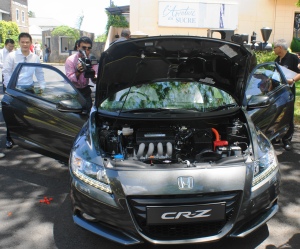 “BLACKOUTS!” This is the threat that some quarters are using to argue the case for more coal-fired electricity production, i.e. CT Power. Environmentalists and local residents are protesting against this but have yet to present viable alternatives. What is the real situation and do we have other options? Continue reading
“BLACKOUTS!” This is the threat that some quarters are using to argue the case for more coal-fired electricity production, i.e. CT Power. Environmentalists and local residents are protesting against this but have yet to present viable alternatives. What is the real situation and do we have other options? Continue reading
Category Archives: Energy
Electric Vehicles: Green Leaf vs. Black Coal
 During MID week at the University of Mauritius in March 2009, Nissan presented its plan for our island to be the 7th nation in the world where the Leaf, their new electric car, would be available for sale. In February 2012, we became the first country in the southern hemisphere to have the vehicles delivered, so why does it appear that we might be the last place on earth where one is actually sold? Some say this is because the government cannot determine what import duty to levy on each car, but might this apparent confusion actually be the fruit of incoherent policies? Continue reading
During MID week at the University of Mauritius in March 2009, Nissan presented its plan for our island to be the 7th nation in the world where the Leaf, their new electric car, would be available for sale. In February 2012, we became the first country in the southern hemisphere to have the vehicles delivered, so why does it appear that we might be the last place on earth where one is actually sold? Some say this is because the government cannot determine what import duty to levy on each car, but might this apparent confusion actually be the fruit of incoherent policies? Continue reading
Old King Coal
 Few countries are at greater risk from man-made climate change than Mauritius. The Maldives may be more dependent on their beaches and Bangladesh on its agricultural land, but can we afford to lose either? Low lying countries and island states are quite rightly joining their voices this week at Rio+20 to call for global agreements to cut greenhouse gas emissions. So why is our government undermining the cause by repeatedly declaring its commitment to coal? Continue reading
Few countries are at greater risk from man-made climate change than Mauritius. The Maldives may be more dependent on their beaches and Bangladesh on its agricultural land, but can we afford to lose either? Low lying countries and island states are quite rightly joining their voices this week at Rio+20 to call for global agreements to cut greenhouse gas emissions. So why is our government undermining the cause by repeatedly declaring its commitment to coal? Continue reading
Honda’s stepping stones to sustainability
 Quite intriguingly, Honda chose the redundant sugar factory – l’Aventure du Sucre – as the venue to launch three hybrid cars in Mauritius. This excellent museum portrays, in graphic detail, the inhuman exploitation of good people of colour by the “then” racist Franco-Mauritian elite. We attended to publicly ridicule the hybrid green-wash propaganda but were pleasantly surprised…
Quite intriguingly, Honda chose the redundant sugar factory – l’Aventure du Sucre – as the venue to launch three hybrid cars in Mauritius. This excellent museum portrays, in graphic detail, the inhuman exploitation of good people of colour by the “then” racist Franco-Mauritian elite. We attended to publicly ridicule the hybrid green-wash propaganda but were pleasantly surprised…
First, because our sparring partner from Yale, and arch supporter of the hybrid deception, Vedant Seeam was guest of honour. Second, because Mr Yoshiaki Nakamura had the perfect repost to our katana-like critique. In his presentation, the President of Honda Motor Southern Africa declared that Honda is committed to an avergage 50% reduction in CO2 emissions from its vehicles by 2020. How on earth did he expect hybrids to achieve that? we asked. He replied that hybrids are but a stepping stone to fossil-fuel free transport, whether it be all electric or hydrogen. Respect sir! Continue reading
The Mauritian Miracle – then and now
Sorry for taking so long to respond to your op-ed on Mauritius. Like many of your academic predecessors, the brevity of your visit earlier this year prevented you looking into the details of the state and history of Mauritius. Please permit me to fill some in.
Although free, universal education was introduced in 1976 in response to student protests, decent education is no longer free in Mauritius. Those who “have” send their children to private schools and those who “have less” pay for private tuition after school and at weekends. The children of those who “have nothing” are severely disadvantaged. Moreover, state tertiary education is largely failing to prepare students for work in call centres so forget about advanced technology.
The same is true of “universal” free, healthcare: those who “have” go to private hospitals, those who “have less” attend private surgeries and purchase medicines from pharmacies, avoiding, like the plague, the state run hospitals and their dubiously sourced pills for those who “have nothing”. For those who need expensive treatment overseas, there is a national lottery. Continue reading
Feedback on MID reports
To the Ministry of Environment and Sustainable Development.
 We are delighted to provide feedback on the reports of the Working Groups for the MID policy development and indeed privileged to be part of the one on energy. Overall, we are happy with much of the work done so far and the comments below focus on exceptions to this. We also attempt to address some of the important issues we feel are missing from the reports and try to synthesise conflicting recommendations. After suggesting improvements to the MID process, we will turn to the security of the economy, nutrition, electricity and transport and then land use conflicts and nutrient recycling. Finally, we comment on individual recommendations that we consider notable. Continue reading
We are delighted to provide feedback on the reports of the Working Groups for the MID policy development and indeed privileged to be part of the one on energy. Overall, we are happy with much of the work done so far and the comments below focus on exceptions to this. We also attempt to address some of the important issues we feel are missing from the reports and try to synthesise conflicting recommendations. After suggesting improvements to the MID process, we will turn to the security of the economy, nutrition, electricity and transport and then land use conflicts and nutrient recycling. Finally, we comment on individual recommendations that we consider notable. Continue reading
The politics of renewable energy
 Dr Pradeep Mahesh Kumar Soonarane, Deputy Director Technical Services at the Ministry of Energy and Public Utilities, made an emphatic statement last week at the launch of the National Energy Research Group, insisting it was recorded in the minutes for posterity:
Dr Pradeep Mahesh Kumar Soonarane, Deputy Director Technical Services at the Ministry of Energy and Public Utilities, made an emphatic statement last week at the launch of the National Energy Research Group, insisting it was recorded in the minutes for posterity:
Mauritius will never have 100% renewable energy
We immediately challenged him, referring to our own scenario for energy self sufficiency. He replied that the future would prove him right.
Dr Soonarane cannot be correct because when fossil fuels are exhausted renewable energies will be the only ones left (along with nuclear for a while). Moreover his statement is not technically accurate as we have demonstrated. We are therefore led to conclude that his statement is a political one and that the government is, for some reason, committed to fossil fuels. Whether this is connected to “commissions” received for signing contracts for fuel supplies, we can only speculate…
Is the MID process the right way forward?
The Green Paper: Towards a National Policy for a Sustainable Mauritius has been published by Government after a year of public consultation. It makes interesting reading and begins well for the first point of the executive summary (P xii) states:
“Never before has it been as necessary and as urgent for Mauritius to review the directions in which the country is moving. Profound and far-reaching changes are sweeping across the globe, some of them forerunners of future shocks that will dramatically impact on the quality of life…Resource depletion, climate change, overpopulation, diminishing conventional energy source, deforestation, pollution on land and sea, rising poverty world-wide, and political instability, are only some of the factors that we now need to confront, and hopefully can overcome.”
Where’s the oil coming from?
 Mauritius could face an oil crisis in the coming weeks as Iran threatens to end exports to India. Mangalore refinery, which supplies all of Mauritius’ petroleum needs, is dependent on Iran for 60% of its crude oil. The problem is that US led sanctions against Iran have made it difficult for India to pay Iran for its oil and the outstanding bill is now $5 Billion. Iran is now threatening to end exports on the 1st of August.
Mauritius could face an oil crisis in the coming weeks as Iran threatens to end exports to India. Mangalore refinery, which supplies all of Mauritius’ petroleum needs, is dependent on Iran for 60% of its crude oil. The problem is that US led sanctions against Iran have made it difficult for India to pay Iran for its oil and the outstanding bill is now $5 Billion. Iran is now threatening to end exports on the 1st of August.
The government of Mauritius has been aware of this problem since January. At the time the Minister of Industry and Commerce, Mr. S. Soodhun assured the country that there were sufficient supplies en route to last for several months. The very same day he announced his desire to build an oil refinery on the island. Meanwhile the STC wants to increase the petroleum storage facilities at Port Louis apparently to avoid supply problems caused by Somali pirates.
The required investments are huge. Even the IMF is warning that oil will become an increasingly scarce and hence expensive commodity. Their advice is to back sustainable alternative sources of energy. Mauritius’ agricultural sector has great potential to produce biofuels. To achieve energy security and protect our economy surely we should look to our own resources?
Energy self-sufficiency
 At the second meeting of the MID Energy working group last week, we presented our major project of 2011: how Mauritius can be entirely self-sufficient in energy. The need to drastically reduce our dependence on fossil fuels is best illustrated by the graph showing them as a percentage of our total merchandise imports. From 1970 to 2000 they were in the range of 5-10% then, from 2000 to 2008, they rocketed up to over 20% and only fell back again as a consequence of the global financial crisis. If we get back to the “business as usual” trajectory, within a decade or two, our fuel bill will be unaffordable unless we are prepared to do without other imports like computers, refrigerators, clothes or food. Continue reading
At the second meeting of the MID Energy working group last week, we presented our major project of 2011: how Mauritius can be entirely self-sufficient in energy. The need to drastically reduce our dependence on fossil fuels is best illustrated by the graph showing them as a percentage of our total merchandise imports. From 1970 to 2000 they were in the range of 5-10% then, from 2000 to 2008, they rocketed up to over 20% and only fell back again as a consequence of the global financial crisis. If we get back to the “business as usual” trajectory, within a decade or two, our fuel bill will be unaffordable unless we are prepared to do without other imports like computers, refrigerators, clothes or food. Continue reading

